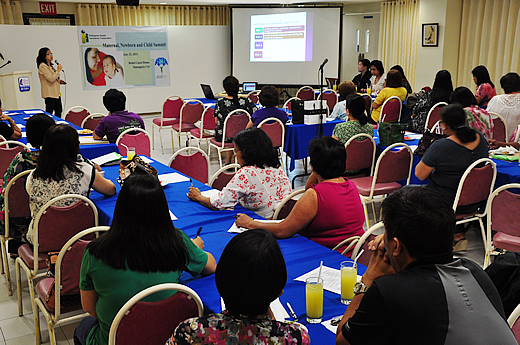PhilHealth
home | contact us | sitemap | disclaimer
News
PhilHealth holds maternal and child health advocacy September 30, 2013
The Philippine Health Insurance Corporation (PhilHealth) conducted an advocacy activity for rural health units in Negros Oriental and Siquijor, encouraging these facilities to support national effort towards improving maternal health and reducing child mortality.
Participants from 19 local government units in Negros Oriental and from all six Siquijor towns attended the activity in Dumaguete City, together with representatives from the Barangay Health Workers Federation and some nongovernment organizations.
PhilHealth hopes to encourage facility assisted births among members, so it aims to engage all rural health units to participate as Maternity and Newborn Care provider.
"Pregnancy is a risk, therefore, delivery should be in a facility," said Dr. Maria Socorro Enterra, Maternal and Child Health/Center for Health Development (Central Visayas) Medical Specialist, one of the resource persons during the activity.
Once a rural health unit participates as Maternity and Newborn Care provider, members or their qualified dependents giving birth in the facility can avail of an P8,000 and a P1,750 PhilHealth coverage for mother and child, respectively.
The Maternity Care package covers pregnancy care from pre- to postnatal. The prenatal care component amounting to P1,500, is payable to the member upon presentation of receipts for prenatal services. The Newborn Care package covers newborn screening and hearing tests, as well as essential newborn care (including among others, Vitamin K administration, BCG vaccination and first dose of Hepatitis B immunization).
PhilHealth applies the No Balance Billing policy in all accredited lying-in clinics. So when members avail of these two benefit packages, no other amount will be charged for the normal delivery and the newborn care.
This is especially beneficial to poor constituents enrolled under the Sponsored Program, which includes those identified in the National Household Targeting for Poverty Reduction (NHTS-PR) of the Department of Social Welfare and Development (DSWD) and, consequently, Pantawid Pamilyang Pilipino program beneficiaries.
Rural health units largely serve poor constituents. If it participates as Maternity and Newborn Care provider, it will receive reimbursement from PhilHealth for pregnancy care services rendered to poor patients because they are no longer charity cases but paying individuals. They have PhilHealth coverage through local and national government sponsorship of their premium contribution.
"Whether we like it or not, manganak man gihapon ng mga tawhana (these people are going to have babies). Nganong di na man lamang nato serbisyohan (Why don’t we just serve them) and get some reimbursement out of it," said Bindoy Mayor Valente Yap, an accountant and advocate for the National Health Insurance Program.
The rural health unit of Bindoy sets an example for other local governments in the Negros Oriental and Siquijor area in providing financial risk protection for the poor.
Bindoy has strengthened the capability of its rural health unit so that it is able to provide PhilHealth’s outpatient diagnostic and preventive care package (Primary Care Benefit 1), the TB-DOTS package for tuberculosis treatment, the Maternity Care package for normal deliveries, and the Newborn Care package for newborn screening and other essential newborn care.
As resource person during the advocacy activity, Mayor Yap shared that since 2002, when Bindoy got on board with PhilHealth’s Sponsored Program, the local government has paid about P14.28 million for the premium contribution of poor constituents. However, they have received back about P15.28 million in capitation payment from PhilHealth for the services provided by its rural health unit. Aside from that, PhilHealth has paid about P34.91 million for the hospitalization claims of Bindoy sponsored members.
"My point of presenting this is to show to you nga kun wala pa ning programaha (without this program), kining (these) hospital claims—dili gyud na kalikayan, magdaot man gyud ning tawo, ma-ospital man na (it cannot be avoided, people get sick, they get hospitalized)—og wala ning programaha, asa man kuhaa ng 34.9 million (without this program, where will that 34.9 million be coming from)? Gikan sa bulsa sa mga pobre natong mga kaigsoonan. This will be taken from the pocket of our poor families who can’t afford to pay the bills. So they’ll be forced to sell their carabao, mortgage their land, and other sources of money," Mayor Yap explained.
The mayor also shared that, as of 2012, Bindoy has received a total of P1.29 million from PhilHealth as reimbursement for Maternity Care services it provided to members.
PhilHealth plans to conduct a similar dialog in the provinces of Cebu and Bohol to bring all local governments in the region on board in this effort towards improving maternal health and reducing child mortality, two of the country’s Millenium Development Goals (MDG). (END)
